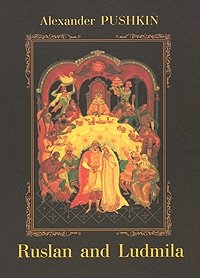Written in 1820, when Pushkin was very young, "Ruslan and Ludmila" was his first major work. Its appearance signalled the birth of a genius who was soon to make all of Russia resound with his name. "The sun of Russian poetry", as the poet came later to be called, was rising.
A graduate of the Tsarskoselsky Lyceum, Pushkin, like his fellow students, had a good knowledge of the literature of classicism with its poetic evocation of a past rich in heroic deeds. In "Ruslan and Ludmila", a poem written in a light and humorous vein and characterized by an easy grace and lucidity, Pushkin saw fit to present this heroic past in a facetious light and to parody the mumbo-jumbo of sorcery and mysticism.
Why the poem, when it was brought out, was met with such sharp controversy, can only be explained by its originality, its complete unorthodoxy. Having chosen for his theme the romantic story of four Russian knights who set out to rescue a princess captured by a wicked magician, the poet introduces a consciously "earthy" approach to it and is quick to ridicule his characters. Ruslan, whose young bride has been carried away from him, is likened to a rooster, "the sultan of the henhouse", Ludmila, to a flustered hen, her captor, Chernomor, to a kite, "a marauder of poultry-yards".
The poem is gay and festive and bubbles with life. The poet makes a confidant of his reader, invites him to join in the fun and to thrust away, as does he, the chains that shackle man"s spirit.
Издание на английском языке. Это и многое другое вы найдете в книге Ruslan and Ludmila (А. С. Пушкин)
